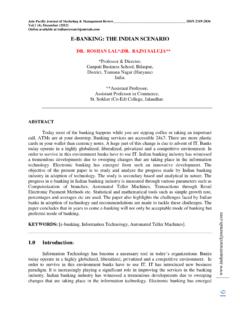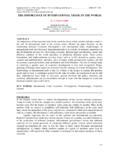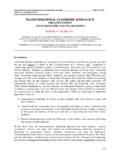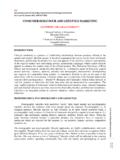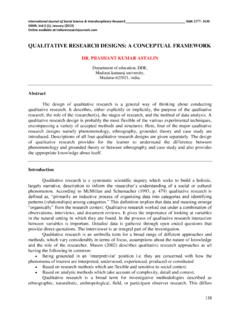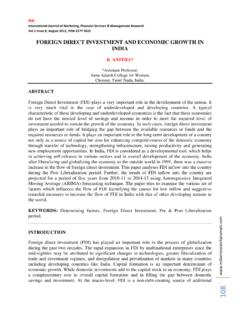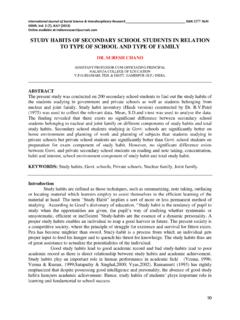Transcription of QUALITATIVE RESEARCH DESIGNS: A CONCEPTUAL …
1 International Journal of Social Science & Interdisciplinary Research_____ ISSN 2277- 3630 IJSSIR, (1), January (2013) Online available at 118 QUALITATIVE RESEARCH DESIGNS: A CONCEPTUAL FRAMEWORK DR. PRASHANT KUMAR ASTALIN Department of education, DDE, Madurai kamaraj university, Madurai-625021, india. Abstract The design of QUALITATIVE RESEARCH is a general way of thinking about conducting QUALITATIVE RESEARCH . It describes, either explicitly or implicitly, the purpose of the QUALITATIVE RESEARCH , the role of the researcher(s), the stages of RESEARCH , and the method of data analysis.
2 A QUALITATIVE RESEARCH design is probably the most flexible of the various experimental techniques, encompassing a variety of accepted methods and structures. Here, four of the major QUALITATIVE RESEARCH designs namely phenomenology, ethnography, grounded theory and case study are introduced. Descriptions of all four QUALITATIVE RESEARCH designs are given separately. The design of QUALITATIVE RESEARCH provides for the learner to understand the difference between phenomenology and grounded theory or between ethnography and case study and also provides the appropriate knowledge about itself.
3 Introduction QUALITATIVE RESEARCH is a systematic scientific inquiry which seeks to build a holistic, largely narrative, description to inform the researcher s understanding of a social or cultural phenomenon. According to McMillan and Schumacher (1993, p. 479) QUALITATIVE RESEARCH is defined as, primarily an inductive process of organizing data into categories and identifying patterns (relationships) among categories. This definition implies that data and meaning emerge organically from the RESEARCH context. QUALITATIVE RESEARCH worked out under a combination of observations, interviews, and document reviews.
4 It gives the importance of looking at variables in the natural setting in which they are found. In the process of QUALITATIVE RESEARCH interaction between variables is important. Detailed data is gathered through open ended questions that provide direct quotations. The interviewer is an integral part of the investigation. QUALITATIVE RESEARCH is an umbrella term for a broad range of different approaches and methods, which vary considerably in terms of focus, assumptions about the nature of knowledge and the role of the researcher.
5 Mason (2002) describes QUALITATIVE RESEARCH approaches as all having the following in common: Being grounded in an interpretivist position they are concerned with how the phenomena of interest are interpreted, understood, experienced, produced or constituted Based on RESEARCH methods which are flexible and sensitive to social context Based on analytic methods which take account of complexity, detail and context. QUALITATIVE RESEARCH is a broad term for investigative methodologies described as ethnographic, naturalistic, anthropological, field, or participant observer RESEARCH .
6 This differs International Journal of Social Science & Interdisciplinary Research_____ ISSN 2277- 3630 IJSSIR, (1), January (2013) Online available at 119 from quantitative RESEARCH which attempts to gather data by objective methods to provide information about relations, comparisons, and predictions and attempts to remove the investigator from the investigation. Design of the QUALITATIVE RESEARCH The design of QUALITATIVE RESEARCH is probably the most flexible of the various experimental techniques, encompassing a variety of accepted methods and structures.
7 Four major types of QUALITATIVE RESEARCH design are the most commonly used. They are: 1) phenomenology 2) ethnography 3) grounded theory 4) case study Firstly, I will review the four QUALITATIVE RESEARCH designs the phenomenological, ethnographic, grounded theory and case study perspectives. Case study can be either QUALITATIVE or quantitative in their approach to data collection. Descriptions of all four QUALITATIVE designs are given below separately. Phenomenology The terminology used by different authors can be very confusing and the use of the term phenomenology is one example.
8 However, it is also used to describe a particular type of QUALITATIVE RESEARCH . Literally we know that phenomenology means the study of phenomena. Phenomena may be events, situations, experiences or concepts. Phenomenology is a way of describing something that exists as an integral part of the world in which we are living. We are surrounded by many phenomena. Certainly, we are something aware of it but not fully understand. Sometimes it happens that our lack of understanding in respect to these phenomena may exist because the phenomenon has not been overtly described and explained or our understanding of the impact it makes may be unclear.
9 For example, we know that lots of people are counselors. But what does counseling actually mean and what is it like to be a counselor? Let us take another example of back pain. There are so many co-relational studies available which tell us about the types of people who experience back pain and the apparent causes. Randomized controlled trials of drugs compare the effectiveness of analgesia against to each another. But what is it actually like to live with back pain? What are the effects on peoples lives? What problems does it cause?
10 A phenomenological study might explore, for example, the effect that back pain has on sufferers relationships with other people by describing the strain it can cause in marriages or the effect on children of having a disabled parent. Finally we can say that wherever is a gap in our understanding and that clarification or explanation will be needed there the phenomenological RESEARCH can begin in a systematic way with the full confident. Phenomenological RESEARCH will not necessarily provide definitive explanations but it does raise awareness and increases insight about the phenomena.
